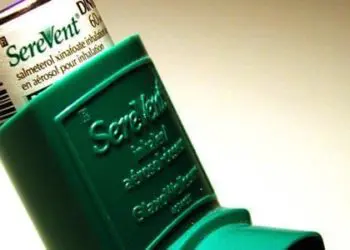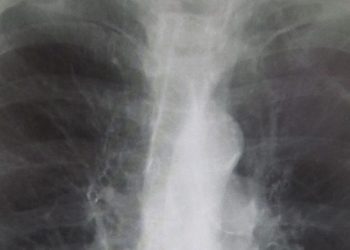Benralizumab reduces oral steroid use in severe asthmatic patients
1. Use of the interleukin-5 receptor antibody benralizumab lowered oral glucocorticoid use while maintaining symptomatic control in patients with severe asthma on chronic oral glucocorticoids.
2. Lung function as measured by forced expiratory volume in 1 second (FEV1) and asthma symptoms were similar for patients treated with benralizumab or placebo by the end of the study at 28 weeks.
Evidence Rating: 1 (Excellent)
Study Rundown: Asthma is a chronic inflammatory disease which in its most severe form is managed with oral glucocorticoids. Adverse effects of oral glucocorticoid therapy make finding alternative therapies a priority. For patients with severe asthma and high eosinophil counts contributing to their condition, antibodies against eosinophilic cytokines such as interleukin-5 may prove beneficial in treatment. This study sought to assess the interleukin-5 receptor antibody benralizumab and its effect on reducing oral glucicoritoid use in eosinophilic asthmatics.
This randomized controlled trial evaluated eosinophilic asthmatics on oral glucocorticoid control therapy. Patients were randomized into placebo or benralizumab groups and their glucocorticoid dose was gradually reduced as much as possible while maintaining control of asthma. The primary outcome was percentage reduction in oral glucocorticoid dose, with secondary endpoints assessing asthma exacerbations and symptoms. Patients receiving benralizumab reduced their glucocorticoid dose more than those treated with placebo. Asthma exacerbations occurred less for patients receiving benralizumab, while lung function tests and asthma symptoms occurred at similar rates for those in the treated and placebo groups.
Click to read the study, published in NEJM
Relevant Reading: Benralizumab–a humanized mAb to IL-5Rα with enhanced antibody-dependent cell-mediated cytotoxicity–a novel approach for the treatment of asthma
In-Depth [randomized controlled trial]: Between 2014 and 2015, 220 patients were enrolled and randomized into two benralizumab treatment and one placebo groups in a 1:1:1 manner. Eligible patients had asthma treated with oral glucocorticoid therapy, inhaled glucocorticoids, and long-acting beta agonists (LABA), and had blood eosinophil counts of greater than 150 cells/mm3. Patients in the treatment groups received benralizumab injections every 4 weeks (n = 72) or 8 weeks (n = 73), while placebo injection (n = 75) occurred every 4 weeks. Patient’s oral glucocorticoid dose was reduced every 4 weeks if patient’s asthma was controlled. Endpoints of the study aimed to assess reduction in glucocorticoid dose, asthma exacerbations, lung function, and asthma symptoms. Glucocorticoid dose reduction was greater for patients treated with benralizumab than in the placebo group (75% vs 25%, respectively; p < 0.001). Odds of reduction of oral glucocorticoid dose were 4.09 times (95% CI, 2.22 to 7.57, p < 0.001) as high for those receiving benralizumab every 4 weeks and 4.12 times (95% CI, 2.22 to 7.63, p < 0.001) as high for those treated every 8 weeks as compared to patients treated with placebo. Asthma exacerbations occurred at rates 55% (95% CI, 0.27 to 0.76; p = 0.003) and 70% (95% CI, 0.17 to 0.53; p < 0.001) lower for those in the benralizumab every 4-week and 8-week groups compared to the placebo group, respectively. By the end of the study at 28 weeks, there was no significant difference in FEV1 before bronchodilation between the treated and placebo groups. There was also no difference in asthma related symptoms or quality of life as assessed by standardized scoring between the 4 week benralizumab and placebo groups.
Image: PD
©2017 2 Minute Medicine, Inc. All rights reserved. No works may be reproduced without expressed written consent from 2 Minute Medicine, Inc. Inquire about licensing here. No article should be construed as medical advice and is not intended as such by the authors or by 2 Minute Medicine, Inc.





![Adverse pregnancy outcomes associated with thrombophilias [Classics Series]](https://www.2minutemedicine.com/wp-content/uploads/2015/07/Classics-2-Minute-Medicine-e1436017941513-75x75.png)

